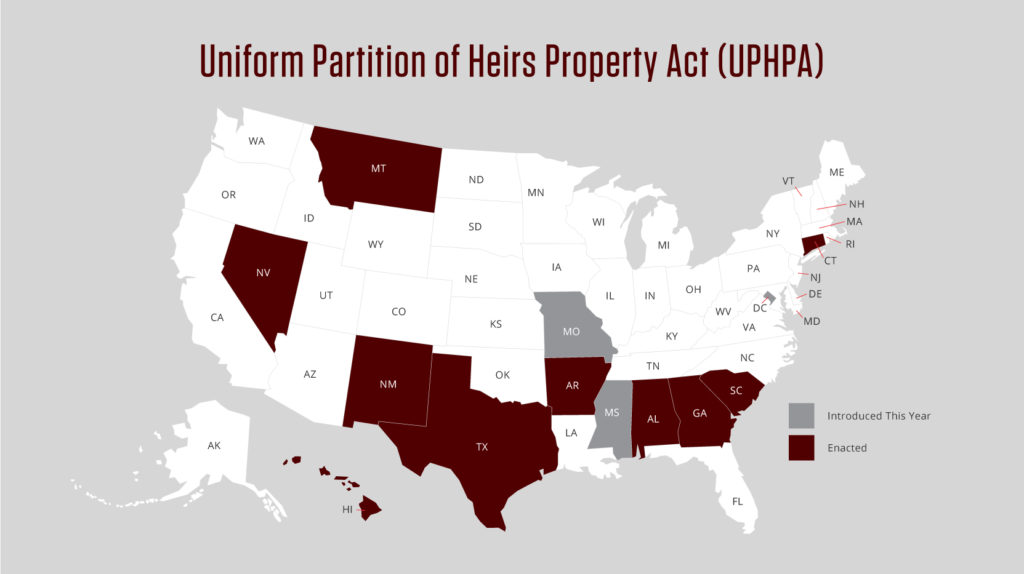Legislation crafted by a Texas A&M University School of Law professor that will provide enhanced inherited property protections to vulnerable, low- and middle-income families has been signed into law by Gov. Greg Abbott after passing unanimously in the Texas Legislature. The properties these families own are commonly referred to as heirs’ property, though the formal legal name for this ownership is tenancy-in-common ownership.
Prior to the Texas enactment, Thomas W. Mitchell’s Uniform Partition of Heirs Property Act (UPHPA) had been signed into law by nine states since 2011, making Texas the 10th state to implement the law. With Texas being the largest, most populous state to sign the bill into law, the bill now has momentum to be enacted into law in additional states across the country and to turn the tides against gentrification and property losses that have disproportionately affected poor and minority communities nationwide.
“It helps families stabilize their ownership so they don’t have to keep looking over their shoulder wondering what random person is going to try and undercut their ownership,” Mitchell said. “By stabilizing their ownership and removing that immediate fear that their property rights are going to be undercut, those families can then engage in planning how can they best use their property consistent with what their values may be, including valuing their land for economic development purposes. It’s a way of stemming or slowing down this unnatural, involuntary property loss.”
Mitchell worked closely during the 85th legislative session with Texas Sen. Royce West and Texas Rep. John Wray, the sponsors who introduced companion bills in their respective chambers. The Texas Senate passed S.B. 499 first, so that bill was the one that the Texas House of Representatives ultimately considered. In addition to working with Sen. West and Rep. Wray, Mitchell also worked with the Uniform Law Commission and the Heirs’ Property Retention Coalition, organizations he has worked closely with over the years in building support for the UPHPA nationally.
Texas A&M President Michael K. Young offered his congratulations to Mitchell after the bill was signed by Gov. Abbott.
“Professor Mitchell’s work since arriving at Texas A&M less than a year ago shows that when scholarship is put into action, there is no limit to the positive, indelible impact one person can have on the state and the nation,” Young said. “I applaud his efforts and look forward to seeing his legislation gain support from additional state legislatures and governors from around the country.”
Texas A&M School of Law Dean Andrew Morriss echoed Young’s remarks.
“Professor Mitchell’s work is precisely what makes having a land grant law school important for Texas,” Morriss said. “His work identified a problem and he engaged with the bar to develop a solution.”
To understand the scope and impact of Mitchell’s legislation, one needs to know a little about the origins of the partition law problem in the United States. For more than 100 years, low-income and otherwise disadvantaged individuals, many of whom have lacked access to legal services as well as deep knowledge about property law, often did not draft legal documents like wills or ownership agreements of one type or another. The failure to draft these type of documents compromised the ability of family members to transfer property in an equitable way upon a family member’s death. The lack of these legal documents also left so-called heirs’ property owners without many important legal protections wealthier families with access to well-trained lawyers normally have with respect to their family-owned properties. The legal protections these wealthier families have enable them to manage their properties in rational ways and give them, as a group, the authority to decide what to do with their properties, including maintaining ownership of these properties, leasing them, or selling them in ways that benefit these families.
For most of the country, partition law provides two dominant ways to resolve disputes among tenancy-in-common owners when at least one of the tenants in common prefers to exit the common ownership arrangement. The first option for part-owners of inherited property is to divide the property via partition-in-kind, which is a physical division of land or property. This could be akin to dividing up family acreage and giving those with an ownership interest who want their own separate property their own subdivided parcels.
The second option, which for years was used in only extreme cases when a physical division would not suffice, is to force a sale of the property and to distribute the proceeds of the sale to the common owners based upon their individual fractional ownership interests. This type of scenario can play out in a dispute over an ancestral home. In this scenario, even someone with a minority ownership in the property, even a one percent interest, can force a sale.
Over time, the forced sale of land or property went from being used in only extreme situations to being the first choice because, in theory, it was economically beneficial to all parties involved and because it was the much easier remedy for a court to order. This opened up a window for the law to be exploited.
“Anybody who is wealthy or sophisticated about the law would know you would want to own real property as a group, what we call common property ownership, under an LLC or some other different ownership forms or agreements that are stable and secure,” Mitchell said. “The people who tended to be negatively impacted because they did not own their family property under ownership forms that were stable and equitable were relatively disadvantaged.”
Heirs’ property ownership can be very unstable, for example, because those who own fractional interests in heirs’ property that are in the path of development in urban or rural settings can be susceptible to speculators and developers. If speculators and developers want an inroad to purchase a property, they will often target a vulnerable part-owner, buy their ownership percentage, which is typically very small, become a cotenant, or owner, and in short order petition a court for a forced sale. When a judge is deciding between partition-in-kind or partition by sale, the historical, cultural and sentimental values of the property often are not considered or are accorded very minimal value. Instead, the only property value the court takes into consideration is economic.
When a forced sale does occur, it often yields a sales price far below market value because the properties do not go through the traditional open market sale process. The listings for the properties are difficult to find; the partition sales are advertised for a very short period of time, often just once or twice in a two week period; and the advertisements of the sales are often in small print in the back pages of local newspapers in the legal section or even in the legal section of newspapers that are only available online.
“What usually happens is that very few people participate as bidders at these public auctions and the sale is often at 50 percent or less of market value,” Mitchell said. “So the heirs’ property owners walk away with their property rights extinguished and their real estate wealth stripped away in the process.”
Mitchell’s research shows these exploitive practices disproportionately affect African-American families across the country, as well as Hispanic and Latino families in the southwest, white families in many different regions of the country, and others including some Native American families.
The UPHPA offers three significant reforms to defend families against the exploitive real property practices that are playing out across the country:
- The cotenants who did not seek a forced sale must be given an opportunity to buy out the cotenant who petitioned to force the sale at a fair price.
- If a buyout does not resolve the issue, then a court can decide whether to order partition in kind or partition by sale. Before deciding, a court must take into account any evidence of the sentimental, cultural and historical value of the property, evidence of any cotenant’s special need to use the property, including if one or more cotenants will be rendered homeless by the sale, as well as various economic factors. In short, the UPHPA rejects an economics-only test in favor of a totality of the circumstances test.
- For those instances in which partition by sale is the appropriate remedy, a revamped sales procedure. Instead of continuing the use of the traditional forced sale procedures, which usually yield below market value and even fire sale prices, a court will appoint a disinterested real estate broker to list the property for at least the value determined by the court. This greatly increases the chances that heirs’ property owners, as a group, will receive compensation at or near the full value of their property.
Nevada, Montana, Arkansas, Alabama, Georgia, South Carolina, Connecticut, Hawaii, New Mexico and now Texas have passed UPHPA legislation since 2011. In addition to Texas, in 2017, Missouri, Mississippi and Washington D.C. have all introduced UPHPA legislation this year, and the law stands a good chance of being enacted in the District of Columbia. In June, Mitchell will deliver a keynote address in Atlanta at a conference co-sponsored by the Federal Reserve Bank of Atlanta and the U.S. Forest Service. He will address various heirs’ property issues, giving his bill even more attention and momentum. It also will provide new opportunities to address other areas of heirs’ property law and policy that his bill does not address.
“I’ve been working with a number of people and organizations to look at the problem of heirs’ property holistically and to highlight the various problematic manifestations of such ownership, many of which have not been adequately addressed,” Mitchell said. “I’m hoping to be able to leverage what I have been able to do on the policy and legal reform front and to work with many other important stakeholders to develop a white paper providing an action plan and setting forth possible solutions to address some of these other, heretofore intractable, heirs’ property problems.”
###
Media contact: Rebecca Walden, rcwalden@law.tamu.edu, 817-212-3933
For more news about Texas A&M University, see https://today.tamu.edu/.
Follow us on Twitter at https://twitter.com/TAMU







